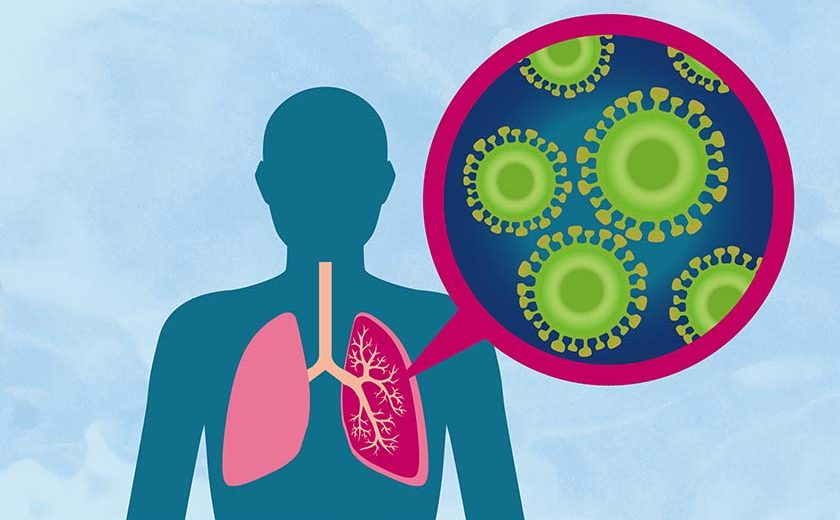Did you know that respiratory diseases are listed as THE number 2 cause of hospitalisation and death in Malaysia?

Professor Dato’ Dr Hj Abdul Razak Muttalif
Senior Consultant Chest Physician at the Institute of Respiratory Medicine
Hospital Kuala Lumpur
Recent data shows that respiratory diseases are recorded at a 12.41% hospitalization rate and 21.70% death rate respectively¹. Respiratory diseases are a serious health problem among Malaysians as we are often exposed to all types of viruses and bacteria in our warm tropical weather. This is definitely a concern as one of the most pressing diseases in the respiratory category is – Community Acquired Pneumonia (CAP).
But first let us start with Pneumonia – what is Pneumonia?
Pneumonia is an inflammatory condition which primarily affects the oxygen-absorbing areas of the lung, or more simply: it’s a lung infection. It is usually caused by a viral or bacterial infection, or less commonly known microorganisms². Pneumonia can cause respiratory failure by triggering a combination of infection and inflammatory response – the lungs quickly gets filled with fluid and become stiff. This stiffness, combined with severe difficulties in extracting oxygen may require long periods of mechanical ventilation for survival.
Streptococcus pneumoniae is the most common bacterial cause of community-acquired pneumonia also known as Pneumococcal CAP. Pneumococcal CAP is one of the leading causes of death and hospitalization worldwide³. Pneumococcal CAP can be classified as non-invasive, when bacteria cause infection in the lungs but are not detected in the blood concurrently, or invasive, when bacteria also enter the bloodstream (bacteraemia pneumonia) or another normally sterile site in the body. While non-invasive forms of CAP are typically more common, the invasive types of disease are generally more severe.
‘Community acquired Pneumonia (CAP) is different than hospital-acquired pneumonia where the disease is contracted by patients who live in a healthcare system in a long term capacity or have recently visited a hospital. A literal understanding of CAP would be that you acquire pneumonia through your everyday life in the community – mixing with people, being in crowded situations and socializing – sounds pretty much like an average Malaysian’s life!
Asia currently is and is projected to continue being, home to a dominant share of the world’s population. According to a United Nations report, the proportion of elderly citizens (aged 60 and above) in the region is expected to increase from 9.9% in 2010 to 23.6% in 20504.In many developing countries, the number of adults aged 65 years and below is expected to grow by more than 250%, with some of the countries including Philippines, Malaysia, India and Bangladesh5. These statistics provide an overview of the alarming rates of the disease in adults and are an indication for the urgent need to address the prevalence of pneumonia in adults.
There are many factors that cause a person to be easily affected with pneumonia but it is especially dangerous when they have a weak immune system. Pre-existing health complications such as Chronic Obstructive Pulmonary Disease (a lung disease that makes it hard to breathe), asthma, renal or liver disease, cancer and diabetes can make them more prone to developing pneumonia6. Additional external factors such as smoking, increased alcohol intake and living conditions such as long-term care residency also have a hand in reducing the functionality of their immune systems, making them more susceptible to the risk of infection and more prone to complications and mortality.
The elderly account for the majority of community-acquired pneumonia infections owing to their lower immune capabilities which naturally weaken with age. This includes even healthy, active older adults! 7 8 9 10
For example, Hajj and Umrah are ideal conditions for community-acquired pneumonia. Research has shown that pneumonia is the largest cause of hospitalisation of Hajj pilgrims during the Hajj season with more than 19.7% percent hospitalisation rate11. The Hajj attracts millions of people from different parts of the world who congregate in a limited area for an amount of time, leading to the widespread of infectious diseases and epidemics. As pneumonia spreads from person to person through respiratory droplets from sneezing or coughing, Hajj provides the ideal environment for the spreading of the disease.
Good news however is that community-acquired pneumonia is a vaccine-preventable disease and vaccines have come a long way from its conceptualization from two centuries ago. A recent study called CAPiTA (Community-Acquired Pneumonia Immunization Trial in Adults) investigated the efficacy of vaccination for immunity in a form of group, or herd immunity, among adults aged 65 years and older. This was the first trial on pneumococcal conjugated vaccine in adults which highlights the efficiency of conjugated pneumococcal vaccine in adults. The CAPiTA findings reinforce the crucial role that immunization plays an important role in reducing the incidence and burden of vaccine-type pneumococcal CAP and IPD among the elderly.
As reported in the study, there were 45.6% percent fewer first episodes of vaccine-type CAP among vaccinated subjects than in subjects who received placebo. It was also found that the vaccinated group experienced 45% fewer first episodes of non-bacteremic and non-invasive CAP and 75% fewer cases of vaccine type Invasive Pneumococcal Disease(IPD). This shows that vaccination for CAP will indeed reduce the burden of the disease significantly among adults.
It is important that we need to be aware of the serious consequences of CAP – that can be easily contracted when you pick up your grandchildren from kindergarten, go to a crowded fair or market or even when you travel to tourist destinations.
As CAPiTA demonstrates, immunization should definitely be a priority as it is the most effective way to be protected against CAP as well as other life-threatening infectious diseases. The benefits of vaccination outweigh the costs associated with its development and administration. It also is a good economic option as it potentially prevents death and hospitalization as well as reduces the cost of treatment, care and rehabilitation, which is why immunization is important in preventing CAP as well as various other life-threatening diseases.
¹ Adapted from 2014 Health Facts by Ministry of Health Malaysia. Available at www.moh.gov.my. Accessed on 9 November 2015
² McLuckie, A., ed. (2009). Respiratory disease and its management. New York: Springer. p. 51.
3 Cunha, BA. Medscape. Community-acquired pneumonia. Updated September 13, 2013. Available at http://emedicine.medscape.com/article/234240-overview. Accessed April 2013.
4 United Nations. World population prospects: the 2008 revision. Highlights. United Nations; 2009. Selected tables. http://esa.un.org/unpd/wpp2008/pdf/WPP2008 Selected Tables 1.pdf.
5 Kinsella K, He W. US Census Bureau, International Population Reports, P95/09-1, An Aging World 2008, US Government Printing Office: Washington DC; 2009.
6 Adapted from “Pneumonia: Causes, Symptoms and Treatments”. Available at: http://www.medicalnewstoday.com/articles/151632.php . Accessed on 16 December 2015
7 Weinberger B, Herndler-Brandstetter D, Schwanninger A, et al. Biology of immune responses to vaccines in elderly persons. Clin Infect Dis. 2008;46:1078.
8 Peto L, Nadjm B, Horby P, et al. The bacterial aetiology of adult community-acquired pneumonia in Asia: a systematic review. Trans R Soc Trop Med Hyg. 2014;108(6):326-37.
9 Rozenbaum MH, Pechlivanoglou P, van der Werf TS, et al. The role of Streptococcus pneumoniae in community-acquired pneumonia among adults in Europe: a meta-analysis. Eur J Clin Microbiol Infect Dis. 2013;32(3):305-16.
10 Said MA, Johnson HL, Nonyane BA, Deloria-Knoll M, O’Brien KL. Estimating the burden of pneumococcal pneumonia among adults: a systematic review and meta-analysis of diagnostic techniques. PLoS One. 2013;8(4):e60273. doi: 10.1371/journal.pone.0060273.
11 Adapted from “Vaccination during Hajj, Umrah, Pfizer launches awareness campaign on Pneumonia”. Available at: http://www/brecorder.com/business-a-economy/189/1242773/. Accessed on 3 October 2012.


